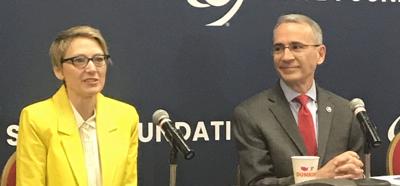More than 20 aerospace leaders on Tuesday made a collective promise at the Space Symposium in Colorado Springs to ramp up the industry’s diversity, equity and inclusion efforts over the next decade.
Rich Cooper, Vice President of Strategic Communications & Outreach for the Space Foundation, joins Gazette reporters Wayne Heilman and Dennis Huspeni for a recap of Tuesday's events at the Space Symposium.
The “Space Workforce 2030” pledge, signed by 24 top executives, is an industrywide commitment to advance diversity throughout the aerospace workforce within the next few years. Steve Isakowitz, CEO of The Aerospace Corp., said the pledge is the initial step in a collaborative effort among corporations that are accustomed to competing against each other.
”We believe we are on the precipice of expanding human presence into the solar system, where future civilizations will live and those future civilizations will represent all of us on this planet,” Isakowitz said. “As we extend our reach further into space, that presence should encompass the full range of people on Earth.”
The aerospace industry is at a critical juncture, with the U.S. and several other nations vying for commercial and military predominance in space, officials said. A diverse workforce will be crucial to America’s drive for aerospace supremacy, Isakowitz said.
In an effort to reach their diversity goals as quickly as possible, companies will periodically hold “best practices” meetings, during which they will share information on which efforts are most effective and brainstorm which areas have room for improvement.
The pledge outlines a series of goals, including bringing more women and people of color into leadership and the technical workforce, broadening outreach efforts at colleges and universities to enhance the talent pipeline, and sponsoring STEM programs at the K-12 level with an eye toward reaching as many as 5 million underrepresented students.
“You gotta start early,” Isakowitz said. “We’re all going to band together to expand (the number of K-12 STEM students) out there.”
In accordance with the agreement, all companies will aggregate their diversity data and report their findings each year at the Space Symposium. This will allow the corporations, as a collective, to determine the efficacy of the initiative.
Creating a more diverse and equitable workplace is not only the right thing to do, officials said, but it is simply good business.
“It would be a mistake if we don’t expand the pool of top talent that’s out there,” Isakowitz said. “DEI (diversity, equity and inclusion) will allow us to do that.”
If it works according to plan, the industry’s diversity efforts should multiply over the coming decades, officials said. If young women and people of color see aerospace leaders who look like them, it will inspire many of them to pursue a career in the industry.
Innovation is an overarching goal of the Space Workforce 2030 initiative, officials said. Aerospace is an industry of ideas, Isakowitz said, and the more diverse the workforce, the greater the variety of ideas.
“Innovation best happens when you get different people, with different perspectives and different backgrounds coming together,” he said. “We are an industry that depends on innovation, and we need to go beyond like-minded individuals to really expand that.”
While most companies have begun their own individual DEI initiatives, the entire industry will benefit by pooling their most effective strategies, officials said. By signing the Space Workforce 2030 pledge, top aerospace officials have committed to meet twice a year to brainstorm and exchange best practices.
Building an inclusive culture in the aerospace industry is a multifaceted process that will involve more than hiring more women and people of color, said Slingshot Aerospace co-founder and CEO Melanie Stricklan. Her company’s human resources professionals also ask pointed questions during job interviews to ensure prospective employees are aligned with DEI principles and practices.
Stricklan and Isakovitz agreed that DEI efforts have to start at the top, which is why they have called on aerospace executives to be more proactive in creating a culture that welcomes people of all backgrounds.
“For us, (diversity) has to be more than talk,” Stricklan said. “It has to be action.”





 Your Privacy Choices
Your Privacy Choices